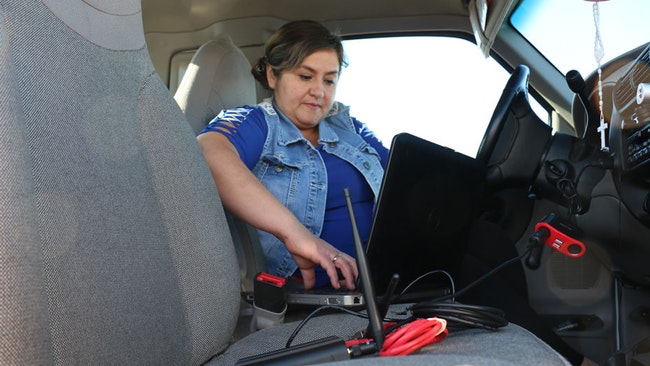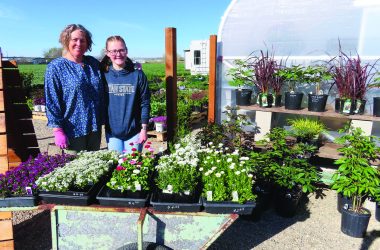
Alicia Ruiz, Treasure Valley Relief Nursery case manager, shows how a newly designed, cost-free web system helps her organization conduct at-home visits in Malheur County. (The Enterprise/Pat Caldwell).
ONTARIO – Ryan Doute spent years working for the U.S. Army disposing of chemical weapons or searching for weapons of mass destruction but one of his greatest achievements happened much closer to home recently.
“It’s quite a story,” said Doute last week.
This particular story, like so many this year, began with the Covid outbreak. Eventually the effort involved several Treasure Valley tech companies and volunteers on the way to creating a unique computer system for a local non-profit.
Last spring, after Oregon established measures to stop the virus, the new mandates put the Treasure Valley Children’s Relief Nursery of Ontario in a bind. State restrictions meant the nursery, which works to prevent child abuse and neglect with at-risk families in Malheur County, could not do its once-a-month home visits. Such visits are required for the nonprofit to continue qualifying for state funding.
About the same time, Boise resident Kyle Burzota, also a veteran, approached Doute about creating a volunteer, quick reaction force of tech industry professionals to help organizations in need. The group, called TechQRF, didn’t not need to search very far to find a candidate for help.
Burzota’s mother sits on the Treasure Valley Children’s Relief Nursery board and told him the organization faced a serious challenge because of Covid restrictions.
Doute said Burzota wanted TechQRF to see if it could solve the relief nursery’s challenge.
“It was a six-month-long endeavor. It’s the kind of thing where it was painful and time consuming but when you succeed it is one of those wonderful things,” said Doute.
The relief nursery needed to find a way to conduct the equivalent of home visits without violating state Covid mandates and while obeying privacy laws protecting the families.
The project turned to technology to see if nursery employees could check in with families remotely but still meet state requirements for providing services.
But neither TechQRF or the relief nursery could afford the software and equipment that could have been one solution. Using the internet for connecting wasn’t a feasible option.
“So, we came up with this idea. Instead of using a 4G wireless internet solution, why not take it back to the 90s and do a LAN solution?” said Doute.
LAN, or local area network, is a computer network that links computers within a small area.
Doute said TechQRF then reached out to Cradlepoint, a Boise tech firm to “see if it was feasible.”
“It was, but demanded custom developed software,” said Doute.
Doute then contacted SWYM, a Boise tech consulting company, which agreed to develop the software for the project. After that, Cradlepoint agreed to donate a router.
Over the next few months Doute and the TechQRF team worked on the project in their spare time but made steady progress until SWYM finished with its software package. There were a lot of bugs to work out, said Doute, but eventually the team achieved success.
“We got to the point where the Cradlepoint router and the custom software would work with any Window machine, Mac or Android mobile device,” said Doute.
The next step for him was to travel to the relief nursery and do a test run of the software and the router.
“After a couple of hours of playing around with end points I got it to link up so all we had to do was purchase the power for it to work in a vehicle,” he said.
Field trials of the program showed it worked.
In practice, he said, the process is straightforward. A relief nursery clinician takes two laptops and a router with them to a home visit.
“All they have to do is plug the router and the controller into a 12-volt power source in their car. They go to their wireless network and connect to their router. The router is encrypted so no one can access that traffic,” said Doute.
The clinician, said Doute, then opens both laptops and connects to the network and the custom-made web server.
“They will see their video feed pop up,” said Doute.
The clinician then wipes one of the laptops down to disinfect it, puts in a bag and then drops it on the porch of the house, he said.
“The family comes out and picks up the end point and sits down anywhere with the children, opens the laptop up and they can do their one-on-one chats,” said Doute.
When the session is over, the family closes the laptop, puts it back in the bag and places it back out on the porch. Then the clinician retrieves the bag, wipes it down and drives away.
Doute said while the execution of the plan was new, the technology is “decades old.”
“We created custom software and sourced hardware to enable them to video chat with their patients with security without the need for internet. No cost associated,” said Doute.
Doute said he is proud of the work he and TechQRF did for the relief nursery.
“We got to play the hero,” said Doute.
Lori Harrison, Treasure Valley Relief Nursery executive director, said she is grateful to Doute and the TechQRF team.
“We are pretty excited. It is amazing,” said Harrison. “We don’t have it in our budget or funding and could never have afforded to do something like this. We feel very blessed.”
Burzota said he was “glad we were able to help out.”
Doute said the all-volunteer and donation effort to help the relief nursery wasn’t as difficult as one would expect.
“I just went out and told the story. And if you do that with a good enough cause, you’ll find people who are good enough to help,” said Doute.
New tip? Contact reporter Pat Caldwell at [email protected] or 541-473-3377.
YOU CAN HELP KEEP LOCAL NEWS FLOWING: Reader support allows the Enterprise to provide in-depth, accurate reporting that otherwise would not get done. Keeping the community well informed is essential. SUBSCRIBE – $5 a month, automatically. DONATE – to provide additional support.




